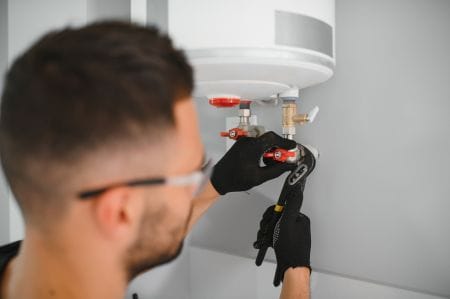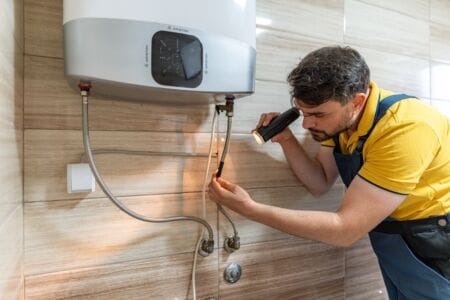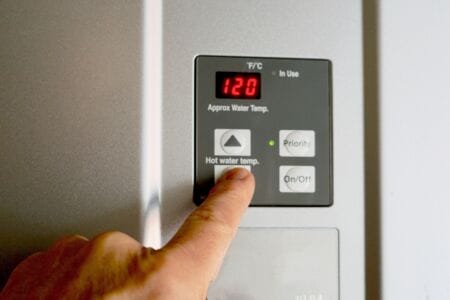Contents
ToggleWhat we'll cover...
In this guide, we’ll explore the most common signs it’s time to replace your boiler, from frequent breakdowns and rising energy bills to strange noises and poor heating performance. There are also pointers on how long boilers typically last, what issues signify costly internal damage, and how upgrading to a modern A-rated model can save you money and stress in the long run.
The importance of boiler repair and replacement
When a boiler begins to play up, it’s easy to ignore the signs and hope for the best. But, like an old car that spends more time in the garage than on the road, an aging boiler can quietly cost you far more than you might realise.
A failing boiler doesn’t just lead to chilly mornings in the house – it can also mean higher gas bills, increased carbon emissions, and safety risks if left unchecked or unattended to.
Here are the seven tell-tale signs your boiler might be due an upgrade, with expert insight from the BestHeating team to help you make the right call for replacement.

1. Your boiler is over 10 years old
Most modern gas boilers have an average lifespan of somewhere between 10 to 15 years, depending on usage and maintenance measures. After this stage, efficiency drops and key components such as the heat exchanger begin to wear out.
Even if your older boiler still “works” in general, it’s likely operating at around 70-80% efficiency – meaning up to 30p in every £1 of gas used is wasted. Contrastingly, a new A-rated condensing boiler operates at over 90% efficiency levels, transforming almost all its fuel into usable heat.
According to the Energy Saving Trust, replacing an old G-rated boiler with a new A-rated model could save up to £580 a year in heating costs for a detached home.
2. Your energy bills are rising
If your gas usage hasn’t altered but your bills continue to rise, your boiler could be losing efficiency.
Over time, a build-up of sludge, corrosion, or scale inside the system reduce heat transfer, causing the boiler to work harder to deliver the same warmth.
Why this matters:
- A 10% reduction in efficiency can increase annual bills by £100 to £150.
- An A-rated condensing boiler can achieve 90-94% efficiency, compared to 60-70% for older non-condensing models.
If you’ve already made your home more energy efficient (e.g. insulation, smart thermostats) and your bills remain high, the boiler is the likeliest culprit, and a replacement should be considered.

3. A boiler leak
A leaking boiler is one of the clearest warning signs of internal failure. Leaks will usually stem from corroded pipework, worn seals, or a cracked heat exchanger – all serious issues that compromise safety and efficiency.
Why replacement is often necessary
- Internal corrosion is rarely repairable once it starts to spread.
- Water damage inside the unit can cause electrical faults and loss of pressure.
- Even small leaks can quickly escalate, eventually resulting in complete boiler failure.
If your boiler is repeatedly losing pressure or you’ve spotted water pooling underneath the system, it’s time to call a Gas Safe engineer.
Persistent leaks, especially from older models, are a typical indicator that it will be cheaper and safer to replace the boiler rather than repair it.
Read more in our dedicated guide, Why does my boiler keep losing pressure?
Strange noises (kettling, banging or gurgling)
Boilers should go about their business quietly, humming faintly in the background. They absolutely should not sound like a boiling kettle or a 90s washing machine on spin.
If you do notice these noises emerging from your boiler – often described as “kettling” – it suggests a build-up of sludge or limescale in the heat exchanger, which restricts water flow and creates hot spots.
You may also hear:
- Gurgling: Trapped air in the system
- Banging: Loose components or system pressure issues
- Whistling: Limescale-related “kettling”
Although minor air pockets can sometimes be fixed by bleeding radiators, persistent or worsening noise often signals a major internal problem.

5. Your house isn't getting warm enough
If your radiators stay lukewarm even with the thermostat cranked up, or your hot water supply runs hot and cold intermittently, your boiler may simply no longer meet your household’s needs.
Possible causes:
- Failing heat exchanger: Heat cannot be transferred efficiently.
- Low pressure or pump issues: Weak water circulation.
- Undersized boiler: Can’t cope with multiple bathrooms or extra radiators.
If the boiler has been properly serviced, and you’ve ruled out potential problems such as airlocks or sludge, it’s likely losing performance due to age.
Modern combi boilers are much more responsive and capable of delivering a consistent level of heat and hot water on demand, particularly in busy family homes.
6. Frequent repairs and callouts
Whilst a one-off repair might be worth it, when boiler breakdowns become a seasonal event, the repair cost can quickly outweigh the benefit.
If you’ve called an engineer out more than twice in the same year, or repairs have totted up to more than 25% of a new boiler’s price, a replacement becomes the obvious smarter choice for the long term.
Why replacing makes sense:
- New boilers are typically accompanied by warranties of up to 10 years.
- Efficiency improvements immediately lower running costs.
- Repeated repairs often indicate end-of-life issues – especially in heat exchangers or printed circuit boards (PCBs).
A new A-rated model reduces maintenance costs and offers peace of mind, with most modern boilers featuring self-monitoring features for safety issues and faults.

7. You're planning a home upgrade or extension
If you’re planning to add new rooms, a bathroom, or underfloor heating to your home, your existing boiler might not have the capacity (kW output) to handle the extra load. In this case, upgrading doesn’t just make sense as a measure of convenience – it’s essential for the provision of a consistent heating and hot water supply.
Why upgrading early pays off:
- Avoids efficiency drops from overworking your current boiler.
- Ensures compatibility with smart controls and zoned heating systems.
- Future-proofs your home for low-carbon alternatives such as heat pumps or hybrid systems.
Learn more in our guide: New boiler, new radiators? The pros and cons of updating your whole heating system
Repair or replace a boiler? A quick checklist
Sign | Repair Possible? | Replacement Recommended? |
Boiler over 10 years old | Only if parts available | ✅ Yes |
Rising energy bills | Short-term efficiency fixes | ✅ Yes |
Boiler leak | Sometimes (minor seals) | ✅ Yes (if corrosion present) |
Strange noises | Chemical flush may help | ✅ Yes (if recurring) |
Inconsistent heating | Maybe pressure or pump | ✅ Yes (if persistent) |
Frequent breakdowns | Costly long-term | ✅ Yes |
New home extension | N/A | ✅ Yes |
What to do next for boiler replacement
If many of the above signs appear familiar, it may be time to start planning a boiler replacement as opposed to an emergency callout.
A modern A-rated condensing boiler can save you hundreds of pounds per year in fuel costs, reduce carbon emissions, and deliver reliable heating for the next decade.

Finding the right time to replace your boiler with BestHeating
Boilers can’t last forever – but recognising the signs of decline early on can save you money, avoid mid-winter breakdowns when you need it the most, and make your home more efficient.
If your current boiler’s beginning to show its age, think of a replacement not as an expense, but as an investment in comfort, safety, and long-term savings. Easier said than done, but it can save a lot of hassle and money over time.
Explore the BestHeating Advice Centre for further handy hints on all things heating, and let us know about your boiler upgrades and savings in the comments, or through our social channels on Instagram, Facebook or X.
John is a Research Specialist for the Best Heating Advice Centre, where for over nine years he has dedicated himself to demystifying home heating for our customers. He specialises in creating clear, data-driven guides and how-to articles by collaborating directly with our team of certified heating experts and product engineers.
His work, built on a foundation of journalistic research, has helped millions of readers make confident and informed decisions about their home heating. When he’s not breaking down the heat output differentials from radiators to heated towel rails, John fancies himself as a fine football and music connoisseur.




